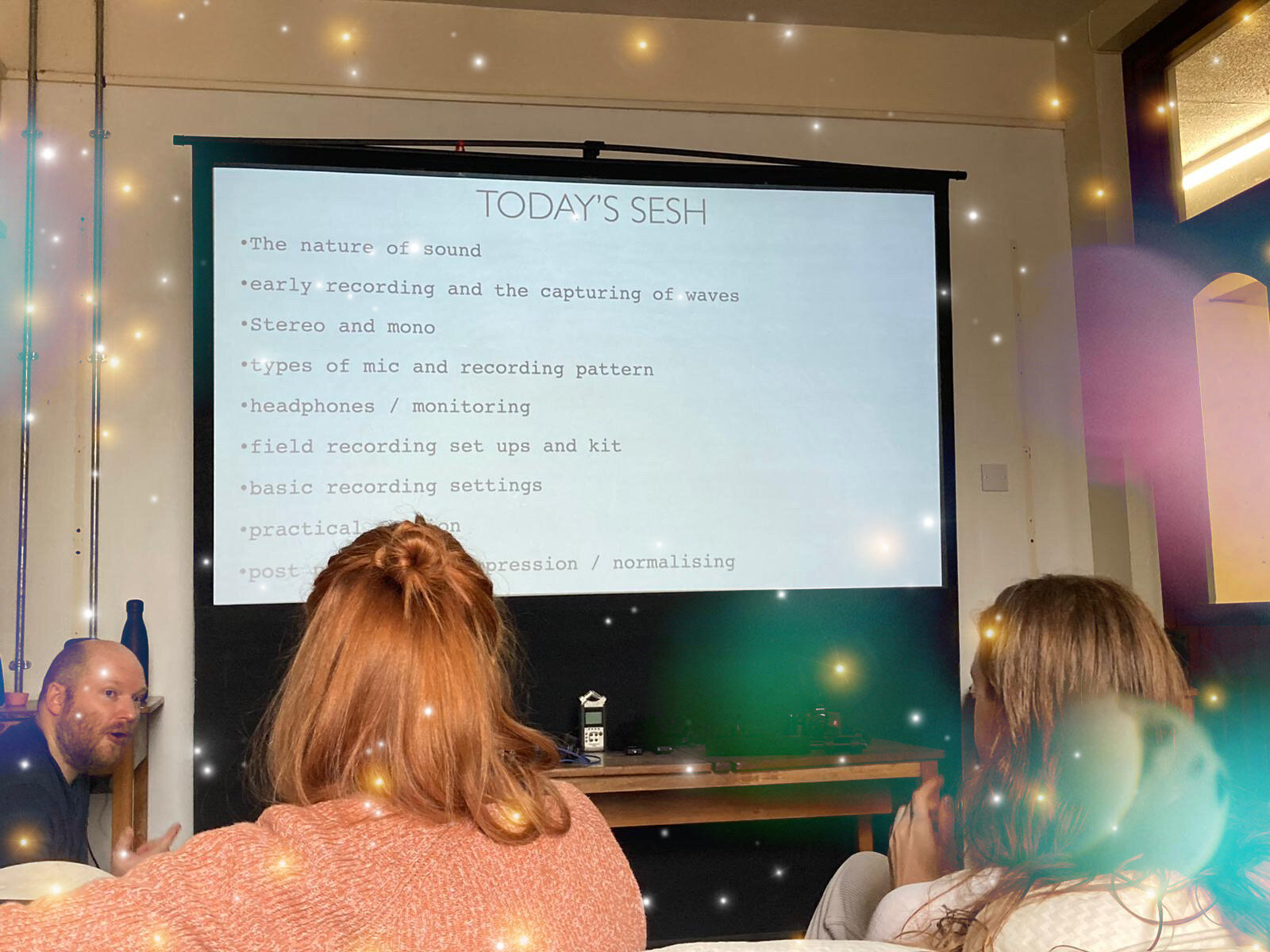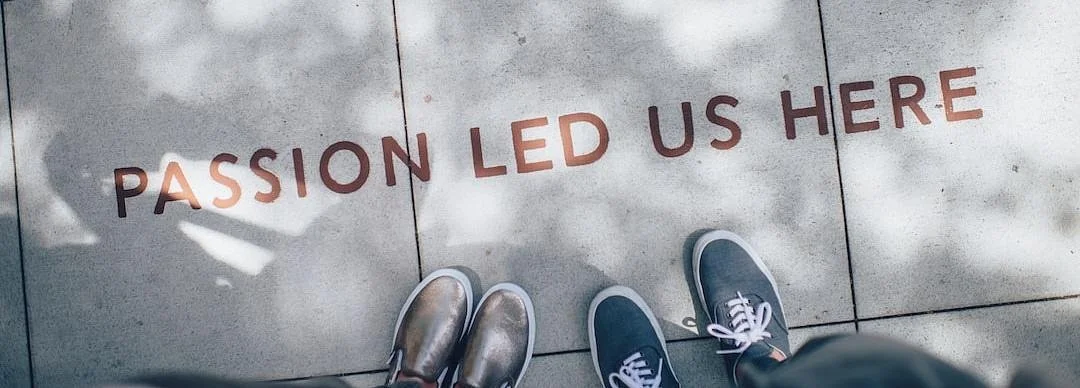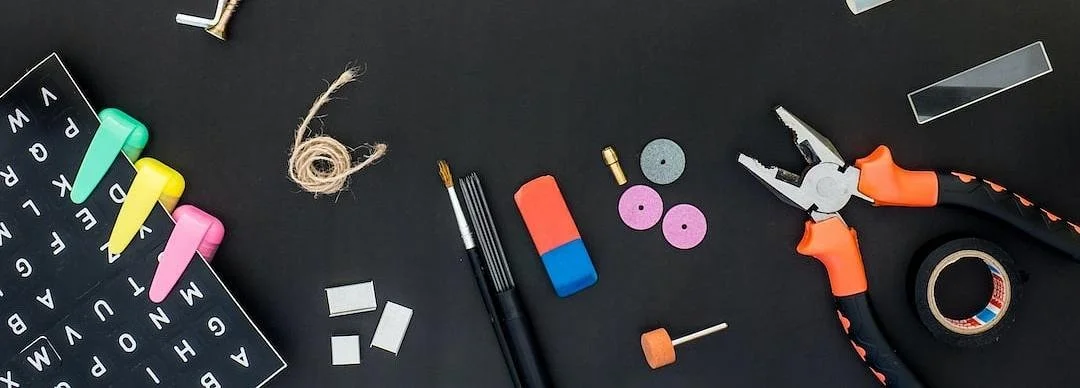D.A.R.P: "life is just a badly designed DARP”
By
Sophie Ruigrok
Image description: a colour photograph, showing a close up of a hand holding a bright red stick of chalk, writing on a dusty blackboard. The words ‘growth’, ‘community’ and ‘love’ are visible, amongst other words, out of focus on the chalkboard. A digital filter has been applied with a cluster of shiny gold stars. Photo credit: Sophie Ruigrok / DARP.
Published in September 2021 as part of the extended digital edition of Social Works? Open journal…
“Hello! We are DARP (the Derbyshire Artist Resident Programme), a co-living and working experiment situated in a disused school in the Derbyshire countryside. Initially founded in November 2020 in conjunction with arts charity Proposition Studios, our project was born of a desire to provide artists and creative practitioners with the time and space to focus on individual projects, while simultaneously benefitting from communal living and proximity to the natural world.”
At DARP, we have been through a period of real growth over the last few months, and have worked collaboratively to form an identity for ourselves. We hope to create a structural framework for a community that can endure regardless of shifting residents, and to provide a basic blue-print for others who may wish to build something similar.
More than a place, we think of DARP as an organic, ever-evolving system, an open system, which responds to and integrates external stimuli. Like a call-and-response pattern, DARP adapts to each residents’ intentions and needs. We intend for DARP to be a portable system that can be transplanted to different places, spaces, environments and times.
At our primary world-mapping workshop, we devised our three principle aims:
1. To foster an open system that allows for (co)creation, autonomy and experimentation;
2. To transform and regenerate this empty school and its grounds; to breathe life into something forgotten;
3. To work with an abundance mindset; to understand that there is enough time, space, resources and love to go around :-)
(un)learning
At DARP, learning is at the core of everything we do. As our bedrooms and studios are based in old classrooms, and remnants of the school’s history surround us, we are constantly reminded of the importance of education.
We strive, however, to break away from traditional, top-down structures of schooling, and instead pool our knowledge, trying, as best we can, to skill-share and learn from one another. DARP residents design and host communal weekly workshops, with past examples ranging from classes in audio design and oil painting, to natural dyeing techniques and foraging. We also believe strongly in collaborative projects and, simply, being supportive of each other’s practices. There is always an audience for creative work at DARP. Here, we hope to unlearn individualistic mindsets, and instead promote collectivism and an economy of support.
We also think it’s important to express that our journey establishing DARP has been a great learning curve in itself: we are a work-in-progress, and we hope to ever be a work-in-progress. We have encountered challenges throughout our time here, from structural issues within the building, to adjusting to communal living and working. But, ultimately, we have only grown stronger, responding compassionately to each other’s boundaries and needs. We aim to learn through empathy, equity and entropy.
communing; open systems for living
Communal living is integral to DARP. We have designed DARP to be a horizontal, non-hierarchical structure, a sociocracy in which each resident’s voice is valued equally.
We use systems to allow the household and studios to run smoothly.
Our systems may be simple, but they work for us:
༄ We host a weekly house meeting in which we begin with check-ins, we discuss what’s working (or, perhaps, not) and devise an itinerary for the week ahead;
༄ We collectively clean and maintain our home after our weekly house meeting;
༄ We schedule recurring events, such as a morning meditation every weekday, gardening on a Wednesday and a work check-in on a Thursday. We think it’s important to add that no communal gatherings are compulsory, as we understand that an individual’s personal projects may take precedence. We always encourage new residents to think of events to contribute to the calendar;
༄ We have two fixed communal dinners a week: we are divided into a Thursday cooking team and a Sunday cooking team. The non-chefs are responsible for the washing up;
༄ In our meetings we use tools such as consent-based decision making, rather than majority voting, in order to integrate objections and give a platform to every resident.
nature and abundance
We believe in the importance of working in harmony with the natural world. Many of our current residents’ practices are environmentally focused, and concepts such as eco-responsiveness and ‘the human as part of ecology’ provide the backbone to our philosophy. We are lucky enough to have a large amount of outside space here, including gardens and a forest, and our site backs onto a public Wildlife Trust reserve. As much as we can, we strive to steward this land around us.
At DARP, we value working with an abundance mindset. We are trying to repurpose and regenerate this site and the offerings that it holds, and, more generally, reduce our waste.
One of the simplest ways we believe we can make a difference is by re-examining our food culture, and, so, we have connected with a local organic farm, who provide us with a generous box of their food waste on a weekly basis. We also forage and incorporate wild plants into our diets, and are in the process of cultivating gardens to grow our own food.
why we care; bodies in space
DARP was born in the later months of 2020, following long periods of pandemic response, social distancing and splintered social encounters. Issues that already pervaded society—such as insidious social isolation fostered by individualistic approaches to living, learning and working—only became more prevalent.
We collectively believe that our drive to overhaul our lifestyles—the drive to base ourselves in a communal, supportive system for living—is vital.
The pandemic left many artists and creatives with more time than ever to focus on their practices. But what failed many was a lack of structure – anecdotally, we have heard countless stories of individuals unable to direct their energy throughout the pandemic, given a lack of emotional and economic support, as well as flailing mental health. We hope to offer a balm to heal these wounds; we recognise the need to be physical bodies in space together.
At DARP, we propose a system that allows for creativity, growth, play and kindness. We hope that this system will inspire more DARPs, and prove that this way of living is a viable and urgent choice.














